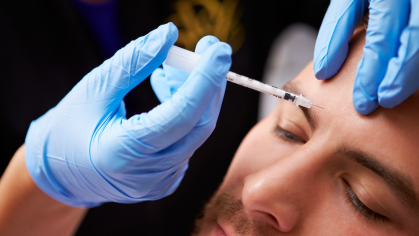
Botox injections
Used to treat conditions such as neck spasms (cervical dystonia). Cerebral palsy, chronic migraines, hemifacial spasms, spasticity, eye twitching, dystonia.
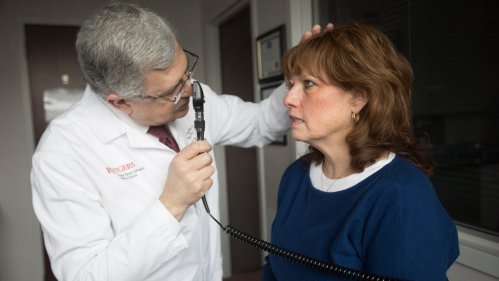
About the Department of Neurology
About
The Department of Neurology at Robert Wood Johnson Medical School prepares residents for a career in academic medicine or private practice. We offer a residency program, a fellowship in epilepsy, a neurology clerkship, electives and a subspecialty subinternship.
Message from the Chair
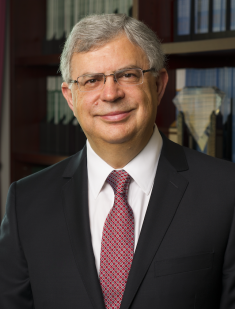
Welcome to the Department of Neurology website at Robert Wood Johnson Medical School in New Brunswick. Our mission is to offer excellent education to our learners, conduct innovative and impactful research, provide high quality patient care and serve the community.
The department, which was founded in 1979, continues to grow and expand in all its core missions. Nationally recognized clinical faculty provide care for patients with various neurological disorders at the Clinical Academic Building and consultative and in-patient services at the Robert Wood Johnson University Hospital. The practice adopts a “patient-first” culture and received the “Gold Seal” designation by 2018. The department also has specialized programs including epilepsy surgery, Deep Brain Stimulation (DBS) for Parkinson’s disease and tremor, and Botulinum Toxin (BOTOX) treatment for movement disorders. Five nationally certified Centers of Excellence in Parkinson's Disease, Multiple Sclerosis, Stroke, Epilepsy, and Amyotrophic Lateral Sclerosis provide state-of-the-art multidisciplinary patient care and conduct therapeutic clinical trials in their respective areas of expertise.
The residency program at Robert Wood Johnson Medical School in New Brunswick was established in July 2008. In addition to the full-time faculty, the Department's educational program is enhanced by volunteer faculty who contribute to the education of medical students and neurology residents.
The department's research activities continue to expand. Physician-scientists and basic scientists conduct funded research in the areas of Parkinson's disease, Multiple Sclerosis and Alzheimer's. These preclinical and translational research programs are housed in the Institute for Neurological Therapeutics (RINT), located on the Piscataway campus. Several undergraduate, PhD and MD/PhD students, and post-doctoral fellows are trained at the Institute.
The Department of Neurology continues to serve the community by participating in patient and physician education programs at the local and national levels.
I hope that you will take the time to learn more about the services we offer, our faculty, and our educational and research activities.
Suhayl Dhib-Jalbut, MD
Department Chair
Ruth Dunietz Kushner and Michael Jay Serwitz Chair in Multiple Sclerosis
Administration
Antoan Sanders, MPA
Sr. Director of Administration
Department of Neurology & Psychiatry
125 Paterson Street, Suite 6200
New Brunswick, NJ 08901
732-235-7730 Neurology | 732-235-5786 Psychiatry
ats157@rwjms.rutgers.edu
Andrea Gill-Simmons
Practice Manager
Psychiatry and Neurology
210 Somerset St, Room 09-121
New Brunswick, NJ 08901
732-235-7930
Gillan@rwjms.rutgers.edu
Sharyce Toppin
Manager Administrative Services
Clinical Academic Building
125 Paterson St, Suite 6200
New Brunswick, NJ 08901
732-235-7337
reedsn@rwjms.rutgers.edu
Chinita Mobley
Program Supervisor
Clinical Academic Building
125 Paterson St, Suite 6200
New Brunswick, NJ 08901
732-235-6017
mobleycl@rwjms.rutgers.edu
Staff
Asha Cilly
Advanced Practice Nurse
Clinical Academic Building
125 Paterson St, Suite 6200
New Brunswick, NJ 08901
732-235-7733
ac1659@rwjms.rutgers.edu
Kelena De-Leon
Secretary I- Epilepsy
Clinical Academic Building
125 Paterson St, Suite 6200
New Brunswick, NJ 08901
732-235-7733
deleonke@rwjms.rutgers.edu
Michelle Holliman
Preauthorization Specialist for Procedures
Clinical Academic Building
125 Paterson St, Suite 6200
New Brunswick, NJ 08901
732-235-7733
hollimmi@rwjms.rutgers.edu
Mini Jomartin, DNP, MSN,FNP-BC
Advanced Practice Nurse
Clinical Academic Building
125 Paterson St, Suite 6200
New Brunswick, NJ 08901
732-235-7733
mj607@rwjms.rutgers.edu
Maryann Mertz
Nurse Clinician
Clinical Academic Building
125 Paterson St, Suite 6200
New Brunswick, NJ 08901
732-235-7733
mertzml@rwjms.rutgers.edu
Michelle Moccio
Advanced Practice Nurse
Clinical Academic Building
125 Paterson St, Suite 6200
New Brunswick, NJ 08901
732-235-7733
mocciomi@rwjms.rutgers.edu
Sandhya Nair
Advanced Practice Nurse
Clinical Academic Building
125 Paterson St, Suite 6200
New Brunswick, NJ 08901
732-235-7733
sn686@rwjms.rutgers.edu
Carolina Ramirez
Secretary I- Movement Disorders, Neurocognitive/Behavioral, and Neuro-Opthalmology
Clinical Academic Building
125 Paterson St, Suite 6200
New Brunswick, NJ 08901
732-235-7733
ramirecb@rwjms.rutgers.edu
Sheila Redding
Research Study Coordinator
Clinical Academic Building
125 Paterson St, Suite 6200
New Brunswick, NJ 08901
732-235-7733
sr1238@rwjms.rutgers.edu
Yaritza Rosario
Advanced Practice Nurse
Clinical Academic Building
125 Paterson St, Suite 6200
New Brunswick, NJ 08901
732-235-7733
rosariym@rwjms.rutgers.edu
Arcival Salazar
Advanced Practice Nurse
Clinical Academic Building
125 Paterson St, Suite 6200
New Brunswick, NJ 08901
732-235-7733
as3836@rwjms.rutgers.edu
Zarinah Shabazz
Secretary I- Neuromuscular, Headache/Migraine, Resident Clinic, and MS
Clinical Academic Building
125 Paterson St, Suite 6200
New Brunswick, NJ 08901
732-235-7733
zs205@rwjms.rutgers.edu
Wiwik Sie
Business Manager
Clinical Academic Building
125 Paterson St, Suite 6200
New Brunswick, NJ 08901
732-235-7733
ws263@rwjms.rutgers.edu
Edward Stenroos
Research Teaching Specialist IV
Clinical Academic Building
125 Paterson St, Suite 6200
New Brunswick, NJ 08901
732-235-7733
stenroos@rwjms.rutgers.edu
Contact Us
To schedule an appointment or speak with support staff please call: 732-235-7733.
To make a donation, please contact Denise Gavala by email dgavala@winants.rutgers.edu or by phone 848-932-6022.
Residency
Adult Neurology Residency
The Adult Neurology Residency Program at the Robert Wood Johnson Medical School trains outstanding clinical neurologists who are astute in neuroscience, compassionate in care and resilient in adversity. We accomplish this through intensive, supervised exposure to inpatients and outpatients, daily formal didactics and mentored scholarly activity. Our program prepares residents for a career in academic medicine or private practice.
Fellowship
Our program is accredited by the by the ACGME and it provides fellows the opportunity for training in the evaluation and management of patients with epilepsy in a diverse environment while having access to the robust resources of Rutgers University. Successful applicants should complete a neurology or child neurology residency in an ACGME-accredited program and be board-eligible or board-certified in neurology or child neurology.
Learn More About the Epilepsy Fellowship
The goal of the Vascular Neurology Fellowship Residency Program is to train outstanding Vascular neurologists who are astute in neuroscience, compassionate in care and resilient in adversity. We accomplish this through intensive, supervised exposure to inpatients and outpatients, weekly formal didactics and mentored scholarly activity. Our program prepares fellows for a career in academic medicine or private practice
Learn More About the Vascular Neurology Fellowship
Clerkship
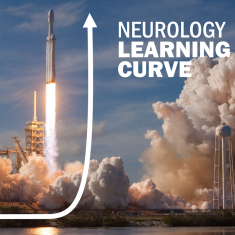
The Neurology Clerkship is a required 4-week clinical clerkship that is currently available throughout the academic year to third- and fourth-year medical students. Students rotate at RWJ University Hospital, JFK Neuroscience Institute, and Monmouth Medical Center where they are exposed to a diversity of neurological disorders of varying acuity in the outpatient and inpatient setting. Whenever possible, the student schedule is modeled on resident schedule with pre-rounding, morning attending rounds, afternoon clinics, sign-out and short calls for an accurate representation of life as a neurology trainee.
The Neurology learning curve is practically vertical, and we get it. Our innovative educational approach centers around flipped classroom learning. In this model, students are asked to review background content by watching a specially produced YouTube review video, confirm their understanding of material with a brief self-assessment quiz, analyze case scenarios in facilitated structured live discussions, and problem solve during a small-group hybrid neurological emergency simulation. Students also participate in small-group Teaching Preceptor sessions, where they receive a more personalized chief-complaint based diagnostic training.
Student learning is marked by the Reporter, Interpreter, Manager, Education paradigm.
Igor Rybinnik, M.D.
Clerkship Director
125 Paterson Street, Suite 6225
732-235-3288
igor.rybinnik@rutgers.edu
Ram Mani, M.D.
Assistant Clerkship Director
125 Paterson Street, Suite 6200
732-235-7340
Ram.Mani2@rutgers.edu
Janet Ryan
Clerkship Coordinator
732-235-6017
ryanja@rwjms.rutgers.edu
Advanced Clinical Neurology Elective
So, you think you want to become a neurologist? Do you want to gain confidence in managing a variety of neurological disorders? Do you need a recommendation letter for residency applications? We have the answer.
The 4-week Advanced Clinical Neurology rotation is available as an elective throughout the academic year to third- and fourth-year medical students who demonstrate satisfactory completion of the required neurology clerkship. Students have a choice for 4 inpatient neurological services (Stroke primary service, Neurocritical care service, General Neurology consultation service, and Pediatric Neurology consultation service) and up to 4 afternoons of neurology subspecialty clinic (one clinic per week).
Students are expected to become primary providers for patients (no more than 4 simultaneously), and appreciate subtleties of history taking and neurological examination, diagnostic uncertainty, and management of complex diagnostic issues through independent literature search and evidence-based medicine. Students will join daily resident didactics and grand rounds and should get accustomed to self-directed learning. The focus of this rotation is to afford the student a neurology resident level experience and to prepare them for a future career in neurology. All budding neurologists are welcome!
Stroke and Neurocritical Care Subspecialty Subinternship
Would you like to gain confidence managing neurological emergencies? Would you like the ability to come up with an accurate neurological differential diagnosis in the 3 minutes it takes to obtain a head CT? Is the Advanced Clinical Neurology elective is not challenging enough for you?
Try the 4-week Stroke And Neurocritical Care Subspecialty Subinternship. This rotation is not for the faint of heart and is open as an elective throughout the academic year to third- and fourth-year medical students who demonstrate satisfactory completion of the required neurology clerkship. Students may choose to spend 4 weeks on the inpatient Stroke service, inpatient Neurocritical care service, or split their time between the two services. There is no outpatient component, and students are expected to take overnight call once per week and one weekend call (see schedule sample).
Students are expected to become primary providers for patients (no more than 5 simultaneously) and learn to manage neurological emergencies such as stroke codes and intracranial pressure crises, appreciate subtleties of history taking and neurological examination (especially in comatose and poorly responsive patients), diagnostic uncertainty, and management of complex diagnostic issues through independent literature search and evidence-based medicine. The focus of this rotation is to afford the student a neurology resident level experience and to prepare them for a future career in neurology. Come prepared, and we will facilitate the next step of your training!
The Neurophile Education Platform
From the brain only, arises our pleasures, joys, laughter and jests, as well as sorrows, pains, griefs and tears.
Hippocrates
Igor Rybinnik, Vascular Neurologist and Neurology Clerkship Director at Robert Wood Johnson Medical School has developed a YouTube Channel called "The Neurophile" which provides learners with helpful videos geared towards diving into various neurological issues of study.
Neurophobia is defined as the “fear of neural sciences and clinical neurology due to… inability of students to apply basic science knowledge” (Jozefowicz RF, 1994). This terrible disorder has a 50% prevalence, affects all genders equally, has familial predilection and bimodal distribution. First manifestation occurs during the preclinical neuroscience course, condition flairs during the Neurology clerkship. Here at Rutgers Robert Wood Johnson Medical School, we are pushing the boundaries of Neurophobia treatment. Our latest intervention is a YouTube channel “The Neurophile,” which is currently undergoing rigorous testing. We design and post review lectures on various neurological topics. Ask your educator if the Neurophile is right for you.
Warning: May cause an irresistible urge to localize lesions and diagnose neurological patients. Some cases are intractable, leading to students becoming neurologists. Caution is advised.
Life at Rutgers

Envision Yourself Here
Rutgers is located in central New Jersey in the city of New Brunswick and across the Raritan River in Piscataway. Middlesex-Somerset-Hunterdon counties rank fourth in per capita income nationwide. It is a manufacturing center, agricultural center, high-tech corporate center, and small-town America rolled into one.
Who We Are
Explore the list of accomplished faculty comprising the Department of Neurology.
More About Our Faculty
Centers and Institutes
The Department of Neurology works closely with the American Parkinson Disease Association (APDA) Center for Advanced Research and the Institute for Neurological Therapeutics.
Clinical Research
Clinical Trials in Multiple Sclerosis
Clinical Trials in Movement Disorder
Clinical Trials in Epilepsy
Clinical Trials in Neurocognitive/Behavioral
Study Contact (for all listed above): Alice Dawson, M.A., phone: 732-595-6336, email: memory411@rutgers.edu.
Clinical Trials in Stroke
Overview
The Department of Neurology provides diagnosis, evaluation, treatment, and management for a range of neurological disorders in adults and children. We treat patients with diseases of the brain, spinal cord, nerves, or muscles. Our physicians and health care professionals emphasize excellence in disease prevention and compassionate patient care.
Divisions

Our Divisions
Our department is made up of 6 divisions, each focusing on a specific area of neurology.
Services We Provide
Specialized Services

Botox injections
Used to treat conditions such as neck spasms (cervical dystonia). Cerebral palsy, chronic migraines, hemifacial spasms, spasticity, eye twitching, dystonia.
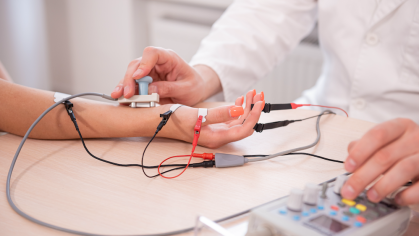
Electromyography (EMG)
A diagnostic procedure to assess the health of muscles and the nerve cells that control them (motor neurons). EMG results can reveal nerve dysfunction, muscle dysfunction or problems with nerve-to-muscle signal transmission.

Skin Biopsy
Specific diagnostic test for this damage as a reduction in nerve fiber density allows for the diagnosis of small fiber neuropathy. Small fiber neuropathy is a disease with symptoms similar to fibromyalgia, but it often has a definable etiology.
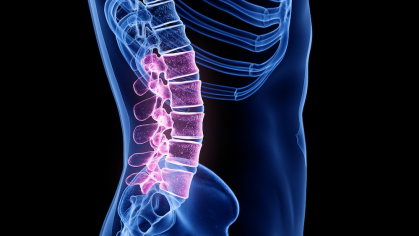
A lumbar puncture (spinal tap)
Assist to diagnose disorders of the central nervous system, such as Guillain-Barre syndrome and multiple sclerosis.
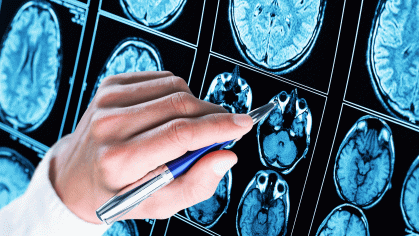
The Deep Brain Stimulation (DBS) Programming
Uses minimally invasive, non-destructive and reversible techniques to help patients with movement disorders, psychiatric disorders, seizures, and certain types of chronic pain.
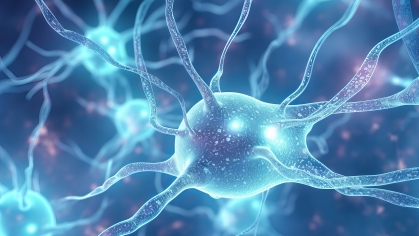
Ultrasonography
Used routinely for evaluation of entrapment neuropathies, hereditary and inflammatory neuropathies, polyneuropathies, myopathies, and motor neuron disease.
